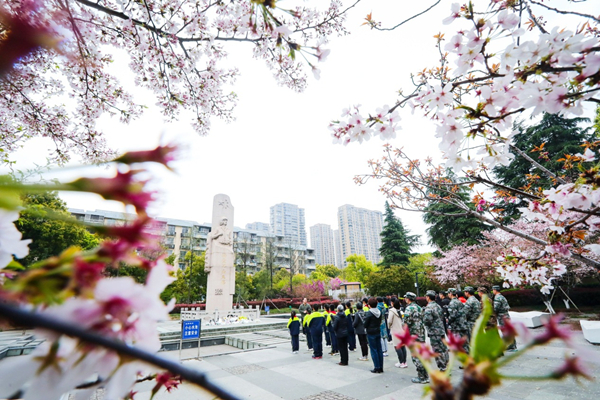Huzhou holds event to commemorates death of naval pilot

People pay tribute to Wang at his grave at a cemetery in Huzhou, East China's Zhejiang province on March 29. [Photo/hz66.com]
Huzhou in East China's Zhejiang province recently held a series of activities to commemorate the 22nd anniversary of the death of Wang Wei, a Chinese fighter jet pilot who was killed on April 1, 2001 in a collision with a United States spy plane near Hainan, China's southernmost island province.
On March 29, a group of people, including retired soldiers, teachers and students, visited Wang's grave at a cemetery in the city to pay tribute to the fallen hero.
Among them is Yang Fan, a retired veteran who now works at the people's armed forces department of Huanzhu sub-district in Huzhou.
Inspired by Wang's story, Yang joined in the army in 2003 and retired 16 years later.
Hailing Wang as a "beacon" in the heart of soldiers in the nation, Yang has made a pact with his comrade-in-arms to visit the pilot's grave every year.
Wang Wei was born in April 1968 in Huzhou.
After spending five years at a flight college under the Chinese People's Liberation Army (PLA) Air Force, he attained the rank of junior lieutenant and was assigned to a fighter jet unit of the PLA Navy in July 1991.
On the morning of April 1, 2001, Wang, who was then a lieutenant commander, and his wingman Zhao Yu were mobilized to monitor a US Navy EP-3E Aries II intelligence-gathering aircraft that had taken off from Kadena Air Base in Okinawa, Japan. The US aircraft had entered Chinese airspace over the South China Sea.
A PLA investigation found that the US plane had ignored warnings from the Chinese jets and made dangerous maneuvers, leading to a collision with Wang's fighter jet.
Wang was forced to eject from his damaged jet.
The Chinese military conducted a large-scale 14-day search for the pilot in the South China Sea but failed to find him. Wang's body was never recovered, and he was presumed dead.
Wang was proclaimed a revolutionary martyr and given the honorary title of "Guardian of Air and Sea".





 play
play